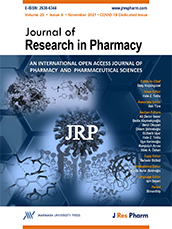Editor-in-Chief
Hatice Kübra Elçioğlu
Vice Editors
Levent Kabasakal
Esra Tatar
Online ISSN
2630-6344
Publisher
Marmara University
Frequency
Bimonthly (Six issues / year)
Abbreviation
J.Res.Pharm.
Former Name
Marmara Pharmaceutical Journal
Journal of Research in Pharmacy
2021 , Vol 25 , Issue 6
Dendritic cell-based COVID-19 vaccines: A mini review
1Department of Pharmaceutical Biology, Faculty of Pharmacy, Universitas Sumatera Utara, Medan 20155, Indonesia2Department of Pharmacology, Faculty of Pharmacy and Health, Institut Kesehatan Helvetia, Medan 20124, Indonesia
3Department of Pharmacy, Faculty of Mathematics and Natural Sciences, Universitas Syiah Kuala, Banda Aceh 23111, Indonesia DOI : 10.29228/jrp.78 Immunotherapy is the latest approach that could offer potential treatments to help fight the 2019 coronavirus disease (COVID-19). This approach can be achieved by several strategies, including dendritic cell-based vaccine therapy. The method of using dendritic cells aims to build a person's immunity against the SARS-CoV-2 virus (the virus that causes COVID-19). In theory, this vaccine works by taking dendritic cells from a person. These cells are then introduced to the antigen of the SARS-COV-2 virus in the laboratory, then injected back into the body in the hope that the dendritic cells that have recognized the virus will trigger an immune response. Several clinical trials are being conducted using the dendritic cell-based vaccine therapy, one of the vaccine candidates known to use a dendritic cell platform developed in Indonesia. The WHO-registered dendritic cell-based COVID-19 vaccine from Indonesia was carried out by AIVITA Biomedical, the Health Research and Development Agency, and the Indonesian Ministry of Health. This article discussed how approved vaccines can trigger innate immunity to enhance long-lasting immunological memory and consider future implications for protecting populations with this vaccine. Keywords : COVID-19; dendritic cell; efficacy; safety; SARS-CoV-2; vaccine

